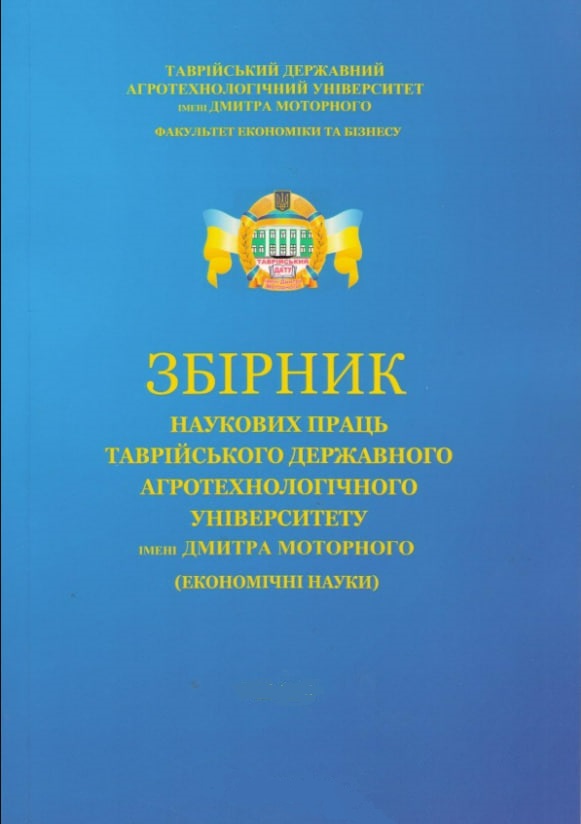РЕЗУЛЬТАТИВНІСТЬ СИСТЕМИ УПРАВЛІННЯ ОРГАНІЗАЦІЙНИМ РОЗВИТКОМ ПІДПРИЄМСТВ
Ключові слова:
Організація, розвиток, результативність, система, управління, підприємство.
Анотація
Анотація. У статті обґрунтовано методологічний підхід оцінки результативності управління організаційним розвитком підприємств: алгоритм формування системної синергетичності соціально-економічних утворень в контексті пріоритетності організаційного розвитку, інтегровані критерії оцінки складових організаційного розвитку підприємств та деталізовану систему показників, методи дослідження в системі, методики визначення показників.
Посилання
1. Гудзинський О. Д., Судомир С. М., Гуренко Т. О. Теоретико-методологічні засади результативного управління розвит-
ком підприємств): [монографія]. К.: ЦП «Компринт», 2017. 411 с.
2. Гудзинський О. Д., Судомир С. М., Нестеренко С. А., Гуренко Т. О., Колос З. В. Організаційно-економічний механізм розвитку підприємcтв АПК: управлінський аспект: [монографія]. К.:ЦП «Компринт», 2019. 352 с.
3. Судомир С. М. Розвиток соціально-економічних систем конкурентоспроможного спрямування. Економічний часопис-XXI. № 9–10 (1)’ 2013. C. 57–60.
4. Судомир М. Р. Організаційний розвиток підприємств: теоретико-методологічні аспекти. Збірник наукових праць Тав-рійського державного агротехнологічного університету (економічні науки). 2013. № 4. С. 267–269.
5. Шейн Э. Организационная культура и лидерство: учебник для слушателей, обучающихся по программам «Мастер де-лового администрирования»: пер. с англ. / Э. Шейн ; под ред. Т. Ю. Ковалевой. СПб.: Питер, 2007. 336 с. 16.
6. Dile, T., Kennedy A. Corporate cultures. Reading, MA: Addison-Wesleys, 1982.-204 р.
7. Shein E.H. Organizational Culture. American psychologist. 1990. Vol. 45(1). P. 109–119.
8. Smircich, L. Concepts o Culture and organizational analyses. Administrative Science Quarterly. 1983. №28. Р.339-358.
9. Ouchi, W.G. Theory «Z»: How American business can meet the Japanese challenge. Reading, MA: Addison-Wesley, 1981. P. 45.
ком підприємств): [монографія]. К.: ЦП «Компринт», 2017. 411 с.
2. Гудзинський О. Д., Судомир С. М., Нестеренко С. А., Гуренко Т. О., Колос З. В. Організаційно-економічний механізм розвитку підприємcтв АПК: управлінський аспект: [монографія]. К.:ЦП «Компринт», 2019. 352 с.
3. Судомир С. М. Розвиток соціально-економічних систем конкурентоспроможного спрямування. Економічний часопис-XXI. № 9–10 (1)’ 2013. C. 57–60.
4. Судомир М. Р. Організаційний розвиток підприємств: теоретико-методологічні аспекти. Збірник наукових праць Тав-рійського державного агротехнологічного університету (економічні науки). 2013. № 4. С. 267–269.
5. Шейн Э. Организационная культура и лидерство: учебник для слушателей, обучающихся по программам «Мастер де-лового администрирования»: пер. с англ. / Э. Шейн ; под ред. Т. Ю. Ковалевой. СПб.: Питер, 2007. 336 с. 16.
6. Dile, T., Kennedy A. Corporate cultures. Reading, MA: Addison-Wesleys, 1982.-204 р.
7. Shein E.H. Organizational Culture. American psychologist. 1990. Vol. 45(1). P. 109–119.
8. Smircich, L. Concepts o Culture and organizational analyses. Administrative Science Quarterly. 1983. №28. Р.339-358.
9. Ouchi, W.G. Theory «Z»: How American business can meet the Japanese challenge. Reading, MA: Addison-Wesley, 1981. P. 45.
Опубліковано
2019-02-10

